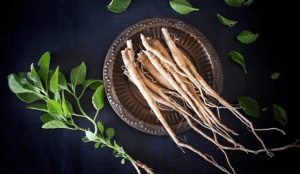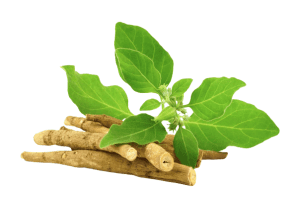If you have practiced Ayurveda or believe in alternative medicine, you are likely to hear the name Ashwagandha many times. And why not, Ashwagandha is one of the most important Ayurvedic herbs. According to the Atharva Veda, the presence and use of Ashwagandha can be traced back thousands of years.

In the history of Indian medicine, it has been termed as a “wonderful herb” or adaptogen because it is one of the most commonly used herbal remedies to reduce the symptoms of stress or anxiety.
What is Ashwagandha?
Ashwagandha is a popular and commonly used medicinal plant in Ayurveda. The name Ashwagandha comes from Ashwa=horse and gandha=odor. Moreover, the name originally came from the root of Ashwagandha, because the smell of Ashwagandha root is like horse urine or sweat.
In addition, Ayurvedic researchers believe that horse-like energy (physical strength and sexual ability) can be achieved by taking Ashwagandha. Ashwagandha Root, leaves, flowers, fruits, bark, pulses all are used as medicine.
Some Basic Facts About Ashwagandha:
Scientific Name: Ashwagandha
Family: Solanaceae (Nightshade Family)
Sanskrit names: Ashwagandha, Varahakarni, Kamarupini
Common names: Winter cherry, Indian ginseng, poison gooseberry
Parts used: Mainly roots and leaves, but also flowers and seeds.
Origin and Geographical Distribution: Ashwagandha has reached most of the tropical regions of India (mainly Madhya Pradesh and Rajasthan), Nepal, Africa, and the Middle East, but now has reached the United States as well.
How Does Ashwagandha Work?
Ashwagandha works in multiple ‘methods’. In Ayurveda, ‘method’ refers to how a herb or plant works on the body. Specific methods of an herb for the overall improvement of the body are called in a different name.
Ashwagandha uses:
- Ashwagandha is called adaptogen because it is used to reduce stress and anxiety.
- Strengthens the body and improves physical and mental health.
- The results of several recent studies have shown that Ashwagandha contains some anti-cancer ingredients. Research is still underway to find out the potential uses of this herb in the treatment of cancer.
- After a study, concerned Indian scientists have claimed that it is effective in reducing joint pain, especially in those suffering from rheumatoid arthritis.
- Studies have shown that Ashwagandha improves vitality and sexual health.
- It helps to remove excess fluid and salt from the body.
- Keeping the body clean and preventing the symptoms of aging.
- One study found that male sperm count increases.
- As an energy booster, Ashwagandha keeps the body warm. In Ayurveda, it is said that it increases bile.
So What is Bile?
In Ayurveda, there are three “faults” or regulators of power in the body – for the health of the individual, which must be balanced. These are:
Vata – Associated with body movements and nervous system.
Pitta (Bile) – Connected with the control of metabolism in the body.
Kapha – corresponds to the fluid balance of the body.
Health Benefits and Uses of Ashwagandha:
Although it has a reputation for reducing stress, Ashwagandha has a variety of effects. Let’s take a look at what this herbal plant can do for health.

1. Ashwagandha For Mental Health:
Ashwagandha has many benefits and uses, but it is primarily used for stress-resistant therapy. Its anti-anxiety properties are compared to those of China and Siberian ginseng. A scientific study has shown, that using Ashwagandha, anxiety, stress, and depression decreased significantly.
This is especially possible for its adaptogenic property and nutritional value. It can be said that its adaptogenic properties help prevent many stress-related diseases, such as premature aging, high blood pressure (hypertension), and diabetes.
2. Ashwagandha for Diabetes:
The study showed that those who have diabetes, their blood sugar levels will come to normal by producing more insulin to the blood. It is found to be equally effective in lowering blood sugar, not only in people with diabetes but also in healthy people. However, it is recommended to consult a doctor before including the use of Ashwagandha in the daily routine.
3. Ashwagandha on Arthritis:
Are you suffering from joint pain or swelling? Studies have shown that Ashwagandha contains anti-inflammatory ingredients. These are especially effective in relieving the symptoms of arthritis.
In Ayurveda, arthritis is associated with the body’s digestive function or bile – Ashwagandha increases bile and reduces arthritis and phlegm. This helps to reduce joint pain. It also helps reduce skin problems such as eczema, psoriasis, and dandruff due to its anti-inflammatory properties.
4. Ashwagandha – As a Strong Immunity Booster:
Ashwagandha with “Mitaki Mushroom Extract” (an edible fungus commonly eaten in Asia) also helps to increase phagocytic action (the ability of our body to destroy unknown pathogens). Thus it increases our body’s ability to fight with infections. So the next time you feel unwell, take a sip of Ashwagandha tea and start fighting coughs or colds.
5. Ashwagandha Helps Heal Wounds:
According to Ayurveda, Ashwagandha is an excellent agent in wound healing. Usually, a poultice of Ashwagandha is applied to the affected skin. Extensive research has been conducted in India to examine the effects of Ashwagandha on diabetic animals.
Studies have shown that wounds heal faster and work better if Ashwagandha has been taken orally instead of direct use. However, since the human trial has not been tested, so consult with a doctor before using Ashwagandha to any wound healing.
6. Ashwagandha for Better Sleep:
Researchers have suggested that although it is not a strong sleeping pill, it does help to reduce stress, anxiety, and help you sleep better.
7. Ashwagandha for Improving Sexual Health:
It is proven that Ashwagandha increases the sexual potency of men and women, and also men whose penis is not erect due to psychogenic causes (men whose penis is not erect due to mental problems) Ashwagandha has significant results on them. A recent study found that Ashwagandha can help increase sperm count.
8. Increases Thyroid Function:
Specific studies have shown that Ashwagandha increases T4 hormone levels in the body. Multiple studies are underway to test the therapeutic potential of hypothyroidism (a condition when the body has low levels of thyroid hormone).
9. Ashwagandha For a Healthy Heart:
Ashwagandha reduces the levels of triglycerides and cholesterol in the body. These lubricants are responsible for heart problems such as heart disease, stroke, and blood clots in the arteries.
Therefore, the adaptogenic ingredients of Ashwagandha help a lot in reducing stress, and this plant relaxes the muscles. So it is a suitable agent to reduce the pressure on the heart muscles. Some researchers claim, that the tonic of this plant plays an effective role in increasing the strength of the heart muscles.
To understand the effects of Ashwagandha on cardiorespiratory capacity, Research on some of India’s leading cyclists has yielded positive results. If we supply more oxygen to the blood, we can stay active for extra time.
Many may be surprised to hear that Ashwagandha has anticoagulant properties that prevent blood clots in the arteries. So this herb can be called excellent cardio protective (protects the cardiovascular system), as it helps alleviate most common heart problems.
10. Ashwagandha for neurological diseases:
Ashwagandha has been shown to reduce the symptoms of Parkinson’s or ADHD (Attention Deficit Hyperactivity Disorder), although the cause is not clear.
11. Ashwagandha for Adrenal Fatigue:
Do you always feel tired? This may be due to adrenal fatigue (adrenal secretion fatigue). Never heard of it? Most people have not heard. But it is commonly heard in today’s ever-busy and fast-paced lifestyle when life is under tremendous stress.
Whether it is work stress or any other type of stress, constant pressure on the body results in the release of a hormone called cortisol from the adrenal glands (glands located above the kidneys), which is the body’s most “stress hormone”.
This is why fatigue, indigestion, insomnia, and nervous weakness symptoms are seen. You already know that Ashwagandha is an anti-stress herb that helps reduce your restlessness lowers your cortisol levels and helps you fight adrenal fatigue.
12. Ashwagandha in Snake Bites:
Numerous studies have shown that Ashwagandha plays a normal immune role in the body against snake venom. It is known that it is a glycoprotein (a type of protein) that is an active ingredient in the body of snake venom that prevents the venom from reaching the surrounding tissues. In India, a coating of Ashwagandha is traditionally used as an antidote against snake bites.
13. Ashwagandha Benefits For Skin:
Is there anyone who doesn’t like immaculate and smooth skin? Did you know that Ashwagandha helps prevent premature aging of the skin? The main cause of aging in the body is free radicals which are caused due to various metabolic activities in our body.
Due to its antioxidant properties, Ashwagandha can fight against these free radicals and keep your skin bright and fresh. Not only that, it protects the body from the problems that occur due to free radicals, skin wrinkles, dark spots, and other symptoms of premature aging.
Additionally, it can be used against keratosis (an abnormal condition of the skin) responsible for dry and uneven skin. It is recommended to drink one cup of Ashwagandha tea daily to reduce the symptoms of keratosis.
14. Ashwagandha For Hair:
Ashwagandha nourishes the hair, which helps reduce hair fall and makes hair long and shiny. Having antioxidant properties, it prevents premature hair loss. It acts as an ideal hair tonic due to the antioxidant and nourishing effects of Ashwagandha.
Ashwagandha supports hair roots by giving nutrition and strengthen the hair. Regular use of Ashwagandha has been shown to reduce stress in the body, and consequently reduce hair loss. Moreover, the antioxidant component of Ashwagandha prevents free radicals and prevents the loss of normal hair color.
Ashwagandha Benefits for Women:
Studies have shown that Ashwagandha is very effective in balancing hormones and reducing menstrual symptoms such as anxiety, irritability, and stress in women. Taking Ashwagandha as a tonic helps to fill many deficiencies due to eating habits and removes toxins from the body as a diuretic agent.
The fewer toxins in the body, the better the body activity. Researchers have shown that Ashwagandha is effective in increasing sexual desire in women. It facilitates this by increasing blood circulation and reducing body pressure in the body.
Ashwagandha Benefits for Men:
Of all the medicinal plants, Ashwagandha is one of the main ones that help increase male fertility. Studies have shown that regular Ashwagandha not only increases sexual desire in men, it is also effective in increasing sperm count and testosterone levels.
The healing properties of the essential oils have been known long in ancient times to promote sexual health in men, as they enhance strength and manhood.
How to Use Ashwagandha and Ashwagandha Powder:
Ashwagandha has been used extensively in diseases such as insomnia, tumors, tuberculosis, asthma, leukoderma, bronchitis, fibromyalgia, and adrenal fatigue. However, to improve physical and mental health, which is called chemistry in Ayurveda, this herbal plant is mainly used as a general tonic.
Ashwagandha is one of the ways to improve your health, as it is a nutritional tonic that comes from your garden. The most common use of Ashwagandha is in the form of powder like tea powder. It is eaten mixed with milk, ghee, or honey.
Nowadays Ashwagandha Mother tinctures (In Homeopathy) and capsules are more popular because they are easy to take and also work fast. It is also available in syrups, body creams, and pastes.
Ashwagandha Dosage:
Here is a general dosage rule is given. However, we inform you to follow your Ayurveda doctor for the doses.
- The usual dose is to mix 1-2 teaspoons of ashwagandha powder with one cup of tea, milk, or honey or take 1-2 capsules twice a day.
- A mixture of Ashwagandha root, milk, honey, and almonds can be used as a sleep tonic. It reduces stress and anxiety.
- A paste or ointment of Ashwagandha leaves can be used to treat wounds or inflammation.
- When used in combination with honey, it is beneficial for sexual health.
- Mother Tincture can be prepared by mixing alcohol with Ashwagandha extract. It mixes easily with the blood and this herb gives faster results than other uses. The potency of the tincture depends on the age and sex of the patient. Consult an herbalist before taking this herbal tincture.
Side Effects of Ashwagandha:
Ashwagandha has many benefits, but it also has side effects. It is important to consult your doctor before taking this herb.
The body of those who are affected by bile is naturally warm, due to the warm effect of Ashwagandha, its long-term use is not good for those people. Prolonged use can cause gastric ulcers, diarrhea, and nausea.
Consult a registered physician if you want to use Ashwagandha in your diet. This can affect the response to the medication you have already taken. For example, a person who is taking blood sugar-lowering drugs may experience low blood sugar levels (hypoglycemia) if he uses Ashwagandha.
Its use in pregnant women is not considered safe; it has been observed many times, that overdosing in animals has resulted in miscarriage or premature delivery.
Ashwagandha thinning the blood and is an anticoagulant, so it should not be used if you have had surgery on your body or have had surgery recently. It should not be used with strong blood thinners as it can cause thinning of the blood which is not good for your health.
It has little sleep medicine effect so it can make you feel sleepy. So it should not be taken with any sleeping pills, as it will cause extra sleep.
Final Words:
There is no doubt that Ashwagandha is a multi-beneficial medical plant, but use it by taking safety measures by the advice of your doctor. Or you can take a small amount of dosage every day; if you don’t feel any bad effect in your body then you are good to go. But if you face any problems like stomach problems or IBS then stop taking it. After taking 2 months then stop for one month or two months then you can take Ashwagandha again if you want, just maintain the ratio.

